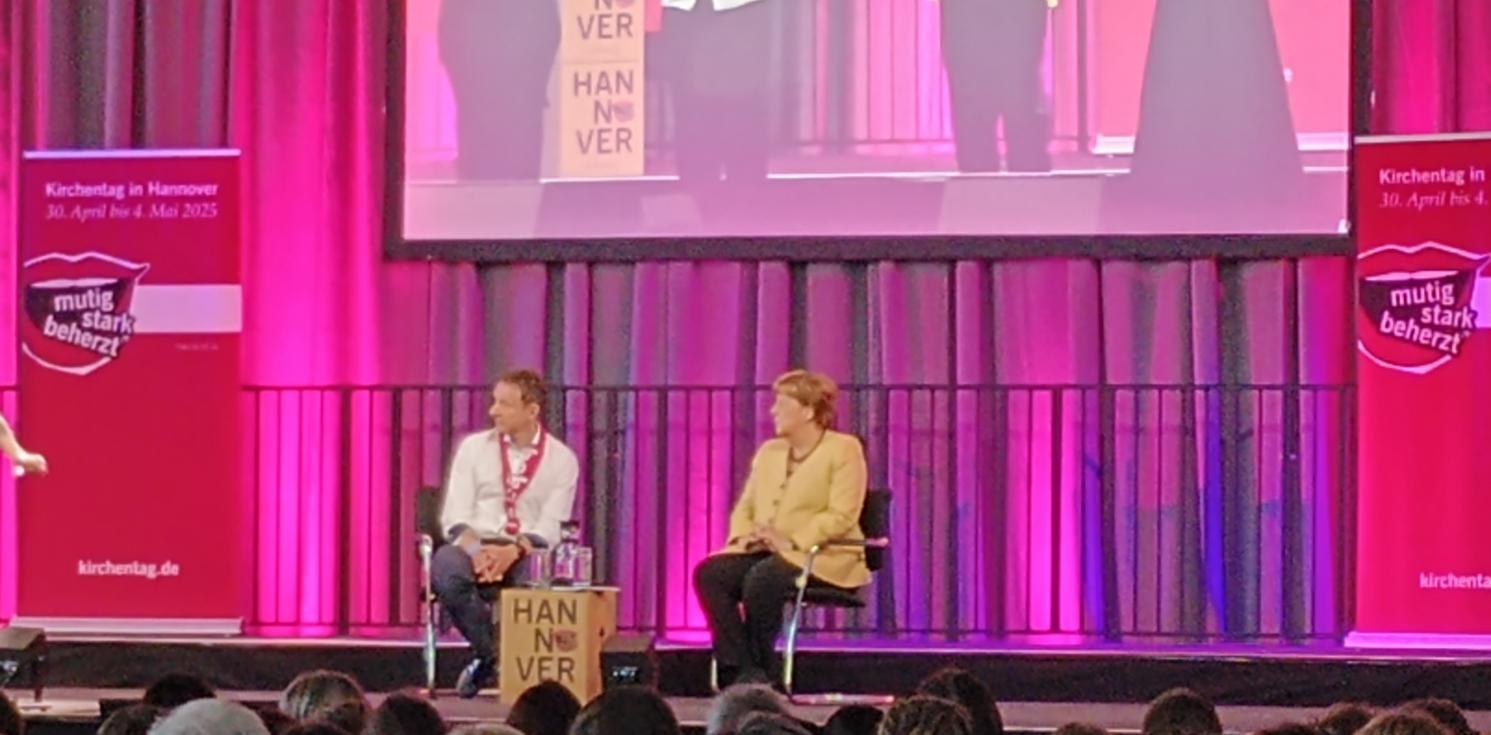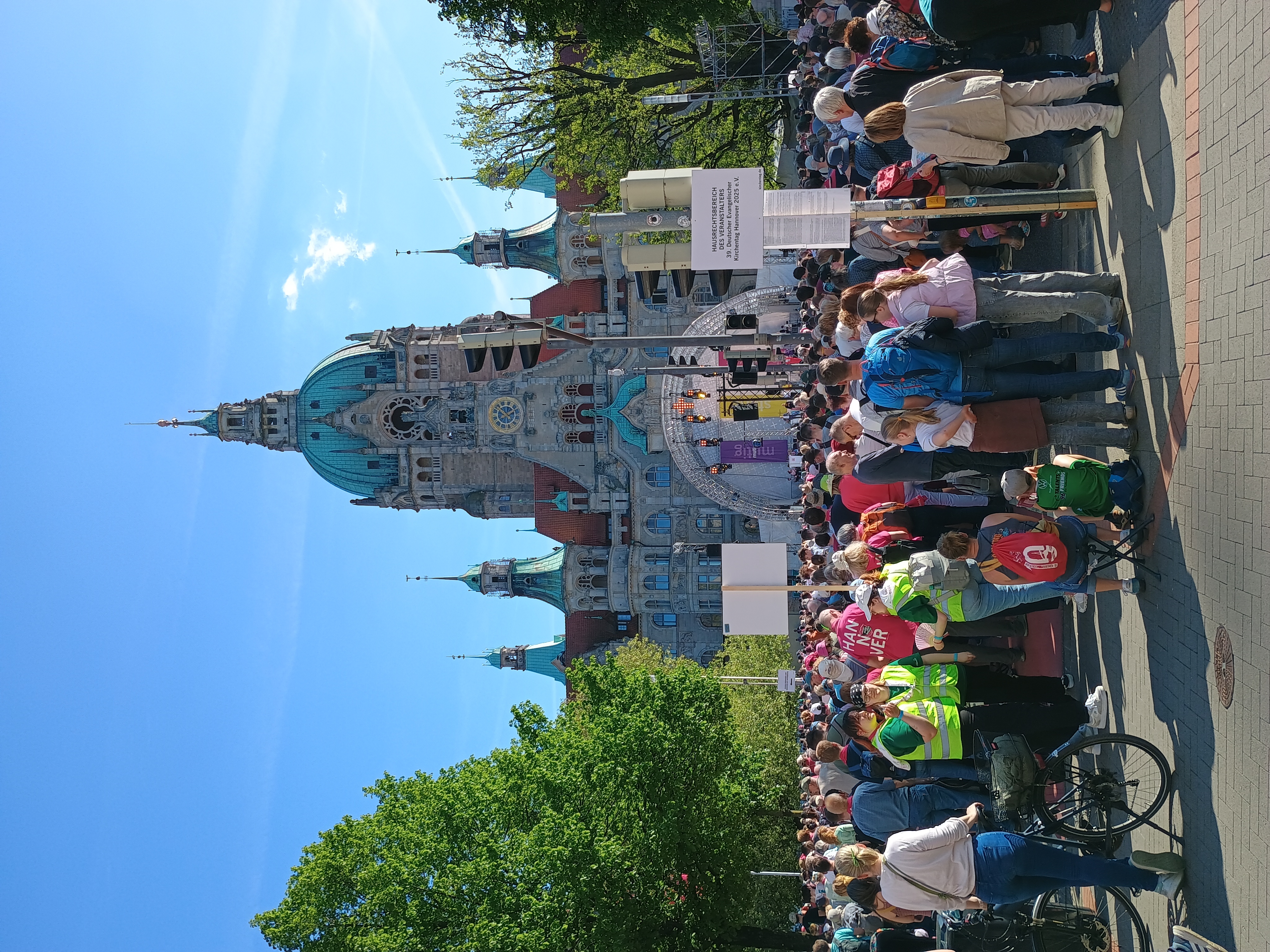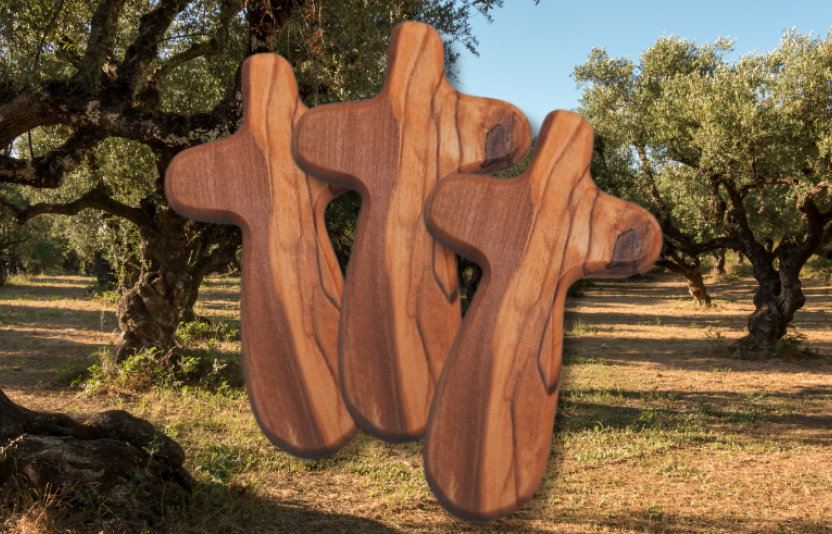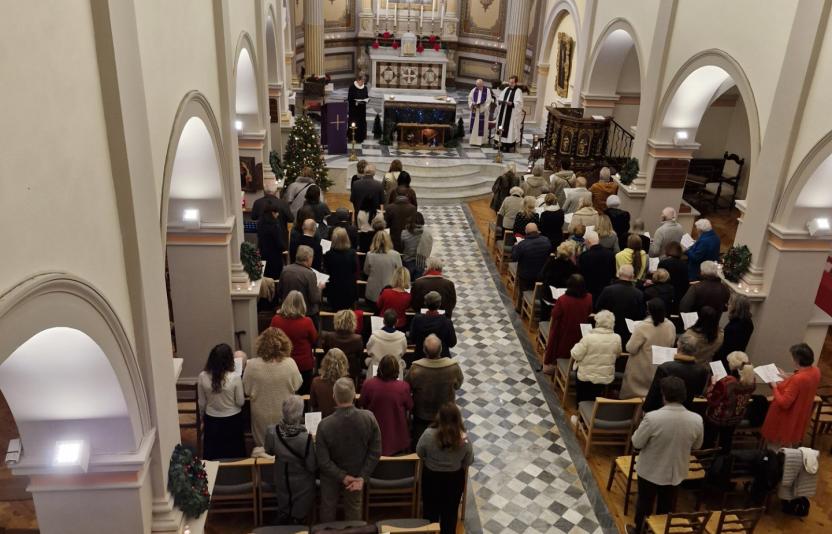Kirchentag 2025

The Revd Canon Tony Dickinson attended Kirchentag, and shares this report below.
The Deutscher Evangelischer Kirchentag is probably the biggest gathering of Christians in Europe. Founded in 1949 by a group of survivors from the anti-Nazi resistance, its chief aim has always been to enable Christians, in Germany and beyond, to relate their faith to every aspect of their lives and so prevent the kind of hijacking of the Churches by an authoritarian regime that took place in Germany in the 1930s. Originally directed at Protestants, it has become increasingly ecumenical and interfaith, with leadership of some of the Bible studies which begin each day shared with Jewish and Muslim contributors.
It's 40 years since the Kirchentag in Düsseldorf blew me away by its size (over 100,000 participants, many of them young) and its breadth of Christian vision. This report traces one participant's journey through the first evening of this great event, from arrival at the main railway station to the gathering of the crowds outside the city's New Town Hall for the main opening service. The congregation was so huge, filling the whole of the Platz der Menschenrechte (Human Rights Square), that massive projection screens had to be deployed, enabling those at the back of the crowd to engage with the leaders on the podium.
After the service international (i.e. non-German) guests were welcomed to a special session laid on by members of the Kirchentag's International Committee with the help of the volunteers who run the international centre. Music was provided by a choir from Kenya and the session was followed by a reception - and some excellent food. Then it was out into the city to enjoy the huge range of offerings from the local churches and other communities which makes up the Evening of Encounter.
The first full day of the Kirchentag was May Day, a public holiday in Germany as in many countries. Still, the morning rush hour was a busy one, as U-Bahn trains arrived empty at the main station and left full of eager Kirchentagers, many of them heading to the city's exhibition grounds and a Bible study led by former Bundeskanzlerin Angela Merkel. She remains extremely popular in Germany, receiving three standing ovations before she had said a word. A pastor's daughter, she gave a confident and competent exposition of St Mark's report of the encounter between Jesus and the cheeky gentile woman who wrecked his hopes of a quiet few days in pagan Tyre (Mark 7). She also spoke about her political career - both its high points and its challenges - in a frank and self-deprecatory way which gave rise to more prolonged applause. The Bible study and the Q&A session which followed were expertly translated by an international team led by Elaine Griffiths, an Australian long resident in Heidelberg, where she is a member of the Anglican congregation.

From the Exhibition Centre it was a few stops on the U-Bahn to one of Hannover's more modern churches, the Auferstehungskirche in Pleinerstrasse. Here was the regular Kirchentag celebration of the agreement between the Church of England and the Protestant Churches of Germany (EKD). It was led by Bishop Ralf Meister, the German co-chair of the Meissen Commission (which oversees the agreement) while his English counterpart, Bishop Jonathan Gibbs of Rochester, preached. During the service Bishop Ralf laid down his responsibility after ten years, and his successor Bishop Nora Steen, was commissioned for her term of office. After the service the congregation enjoyed the spring sunshine and the chance to chat. Among participants from the UK were a retired priest from Cambridge and his wife, the Lutheran pastor responsible for congregations across north-eastern England, an archdeacon from Devon and an Anglican bishop from Huddersfield (via Copenhagen), who represents the British and Irish churches on the Kirchentag International Committee.
Music is an important part of the Kirchentag, and one group, Habakuk, has been around for more than forty years, performing its own version of modern spiritual music. Like Dr Who, the group's membership regenerates from time to time, but Eugen Eckert, the group's founder, remains a constant. The church in which they gave their main concert at this Kirchentag, St Joseph's, is not small, but the "Church full" signs were up early, and late arrivals had to wait for others to leave before they could enter and enjoy the music, much of which was new.
More music in the evening for this Kirchentager, but of a rather different style. Judy Bailey, born in Barbados but now resident in Germany, where her son is making a promising career as rapper, has been rocking her particular style of folk/Gospel music for many years in many countries. It certainly speaks to Christians in Germany, as the large crowd of all ages were bopping along to the music.
Continuing the musical theme, on Friday morning there was a Bible study for musicians, which in the context of Kirchentag means brass players - though a solitary guitarist was spotted leaving the hall at the end of the session. Those who brought their instruments with them were given a sheaf of music at the door - the interludes punctuating (sometimes very pointedly) a two-handed study of Jeremiah's letter to the Judean exiles in Babylon.
There are hundreds of volunteers who keep this massive show on the road, the Helpers: many of them members of the Scout movement. They provide muscle where it is needed, or directions, or a listening ear, or motive power for a wheelchair, or any one of a thousand tasks which oil the wheels of the Kirchentag. They usually get a special round of applause at the closing service - and my word, they've earned it!
On Friday morning the Green MP, Katrin Göring-Eckardt, who is a graduate in theology, led a Bible study on Jeremiah's letter. A few hours later you would have found her in waitress uniform, serving lunches at the Glass Restaurant, a Kirchentag pop-up which serves environmentally friendly and locally sourced food at very reasonable prices. One of the many events on Friday afternoon was an interesting discussion about the connections between spirituality and healing. Speakers reflected on the transformative power of walking the Camino de Santiago, on the ancient tradition of laying on hands with prayer, and on the resources of wisdom and insight available through the writings of great spiritual figures of the past, not all of them Christian.
May in Germany is "Spargelmonat" (Asparagus Month). On Friday evening, my original plans having been frustrated, I gave a nod to this time-honoured tradition.
The U-Bahn from the main railway station to the Messe was as busy as usual on Saturday morning. Someone was heard referring to this as "the Bible study rush hour".
When the U-Bahn unloaded its passengers at the Messegelände, the main venue for Kirchentag events, many people headed to Hall 2, where the crowds were comparable with those for Angela Merkel two days earlier. We were all waiting for an American Episcopalian Bishop - not a rock star, not even a major figure from the political world. The Kirchentag's General Secretary, Kristin Jahn, introduced Bishop Mariann Budde, of Washington DC, the woman who dared to speak truth to power on the morning of President Trump's inauguration. She led (in English) a thought-provoking study of Matthew 28:1-10, angels, earthquakes and all.
Sadly, that is my final memory of this year's Kirchentag. Family matters meant that I had to leave before the closing service on 4th May - and, indeed, before the end of Bishop Budde's Bible study. But I am already thinking about possibilities for Düsseldorf in 2027 - So Gott will und wir leben.


